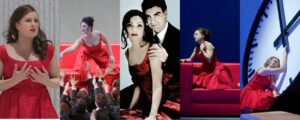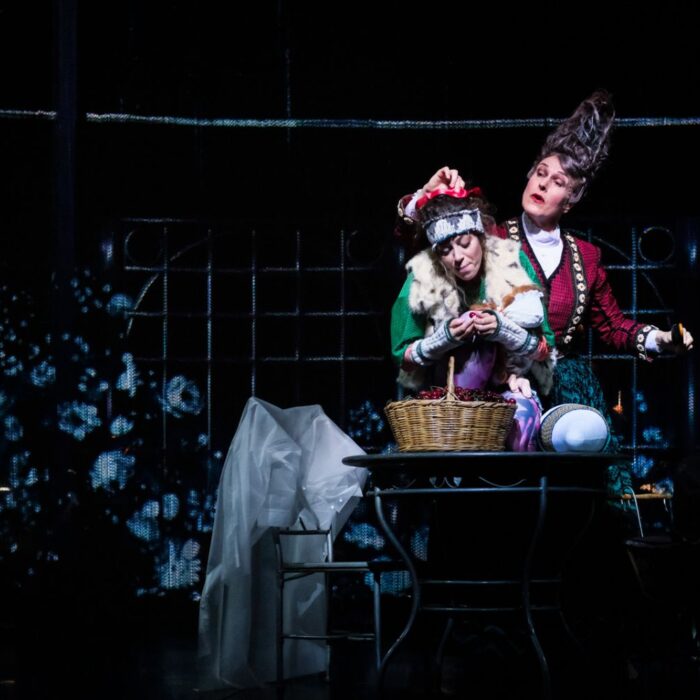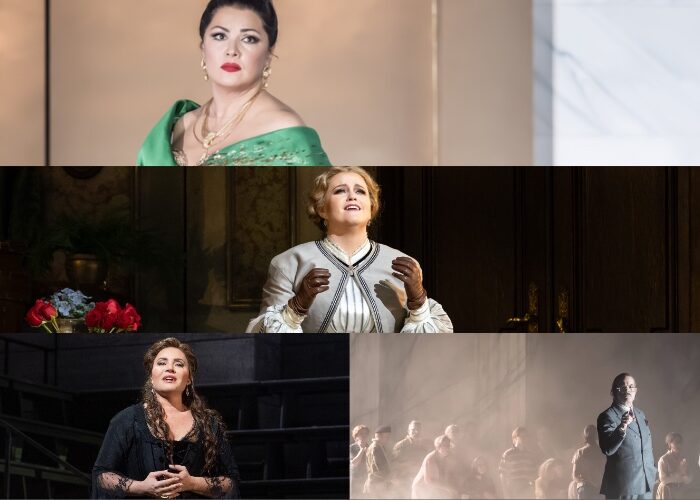
Celebrating 20 Years of Willy Decker’s Iconic ‘La Traviata’ – A Look Back at the Memorable Performers
By Francisco SalazarOn July 19, the Teatro Real will broadcast the iconic Willy Decker production of “La Traviata,” marking 20 years since the production premiered.
When it opened in 2005, it became an instant classic for its modern, minimalist approach and its stark staging focusing on the three main characters. The production also emphasized time and Violetta’s impending death through a large clock.
The staging has stood the test of time and has brought the best out of many of its performers. It has traveled to numerous theaters and has been broadcast three times at the Metropolitan Opera and the Salzburg Festival, showcasing the diverse interpretations. In some cases, it has fortified the star power of some of its interpreters. So to celebrate its 20th anniversary, OperaWire takes a look back at some of the most important artists to take on the production.
Anna Netrebko-Rolando Villazón-Thomas Hampson
When the production premiered in 2005, Anna Netrebko and Rolando Villazón were all over the opera headlines for their chemistry and committed performances. It electrified the opera world and made both singers superstars. It also had opera companies all over the world excited to pair them together in different productions. In essence, they became iconic, and the performance was immediately released on DVD and on CD, selling 30,000 copies in Austria, a landmark never before reached by an opera recording. The International Federation of the Phonographic Industry even presented a platinum record award to Netrebko, Villazón, and the Vienna Philharmonic.
But above all fanfare the performances of the two leads were committed with critics stating, “Netrebko gives the performance of her young career, one equally adept at glittery coloratura and in the longer-spun melodies signaling Violetta’s emotional depth” while Villazón sings Alfredo with a voice of liquid beauty yet thrillingly meets the dramatic challenge of Alfredo’s public humiliation of Violetta.”
Thomas Hampson, who also joined the leads, gave a committed performance, which was lauded for his masterful portrayal.
Marina Poplavskaya
Russian soprano Marina Poplavskaya brought the Decker production to the Dutch National Opera in 2009 and then in 2010 to the Metropolitan Opera, where she created a sensational portrayal for her raw acting. The soprano was the first well-known singer to take on the iconic production, following in the footsteps of her predecessors, making the production her own.
Critics said, “Marina Poplavskaya grabs our attention by sheer force of will from the moment she makes her entrance during the prelude, staggering slowly backward in red dress, red shoes with stiletto heels and long blond hair, only to collapse beside the doctor. When she rouses herself to go to work during the first-act party scene (attended by a sinister mob of men and women dressed in identical black suits), the last thing she expects to find is true love, in the form of a guest — Alfredo Germont, who has worshipped her from afar.”
Marina Rebeka
In 2014, Marina Rebeka, who was a rising star at the time, brought her iconic Violetta to the Met. The role was one of the soprano’s signature roles at the time, performing it at every major theater in the world. In Decker’s production, the soprano got to show a new side to her interpretation that hinted at the star she would eventually become worldwide.
Critics were impressed, stating, “She acts and sings Violetta superbly. The beauty and technical polish of her voice is expected, and she also has the qualities that Verdi’s music demands—she can modulate dynamics, tone quality, and emotion with agility, and spits out words with fire, when called for.”
Diana Damrau – Plácido Domingo
In 2013, Diana Damrau made her role debut as Violetta, a role that she had been longing to sing. The soprano, who was moving from coloratura into more lyric roles and was well known for her charismatic stage presence. She had made an impression as “Lucia di Lammermoor,” Adele in “Le Comte Ory” and Rosina in “Il Barbiere in Siviglia” among many others. And as Violetta, she proved a perfect fit, especially in Decker’s production, bringing out the mature and tragic qualities of the character. Critics said, “her voice both broadened and focused, encompassing both filaments of sound and full-voiced cries in a haunting ‘Addio del passato” and “her ethereal, wounded “Dite alla giovane” took on a fresh poignancy.”
During the run of performance, legendary singer Placido Domingo took on his first Germont, expanding his historic repertoire and singing a lush “Di Provenza il mar” with ardent sound.
You can watch a bootleg version here.
Natalie Dessy – Dmitri Hvorostovsky
If there was ever a perfect fit for this production, it was Natalie Dessay, who was always up for experimental productions that would test her dramatic abilities. She was known for her dramatic acting and her expressive voice, and while she finally sang her dream role in the later years of her career, the Decker production proved to be iconic for the soprano in 2012. Those who witnessed the singer saw Dessay make “a wrenching impression as the fatally ill courtesan.” As the New York Times said, “she brought ethereal sound and a searching character to the soft phrases of ‘Ah, fors’è lui’ and her “‘Addio, del passato,’ Violetta’s farewell to dreams of happy days past, while not a model of technical refinement, was mellifluous and achingly real.”
As her stage partner, Dessay had Russian baritone Dmitri Hvorostovsky, who brought his imposing stage presence and gorgeous velvety voice to the role. He was the perfect foil for the diva.
Sonya Yoncheva
Sonya Yoncheva was known for her Violetta around the world, and it was with this role that she cemented herself as one of the most in-demand sopranos. Some even called her the best Violetta since Maria Callas. So when she arrived to sing the role at the Met in 2015 and then in 2017, there was no doubt that audiences were in for something special. Critics said, “Ms. Yoncheva’s voice, strong and faintly smoky, ebbs and flows over phrases, scenes and acts. She plays the long game.” OperaWire added, “She was particularly affecting when making vocal transitions utilizing crescendos, most specifically in the famous “Ah fors’è lui che l’anima.” As Violetta transitions from uncertainty regarding her feelings for Alfredo into singing his own declaration of love, Yoncheva put together a soaring crescendo on an E natural (“Destandomi all’amor”) that emphasized this transformation.”
Yoncheva had the opportunity of singing the staging with its original cast member, Thomas Hampson, and also celebrated the Met’s 1000th performance of “La Traviata” with this production.
Categories
Special Features

